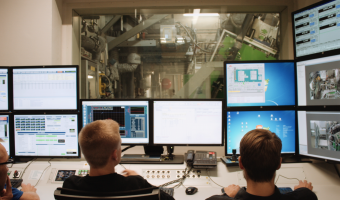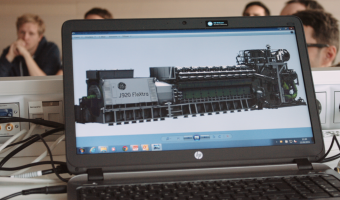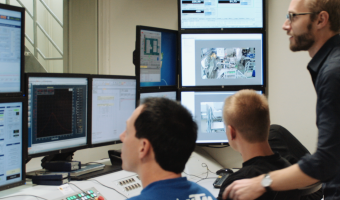Jobs With Excellent Prospects at the LEC in Graz
Jobs With Excellent Prospects at the LEC in Graz
Mobility and power generation are some of the most important areas of modern life. We continue to be presented with challenges due to our dependence on fossil fuels for transportation, pollutant emissions arising from public transportation that serves millions of passengers, the shipping of goods around the globe and above all the production of energy.
Homegrown cutting edge research among the best in the world
The Large Engines Competence Center at Graz University of Technology conducts research in the challenging field of large engine technology. Andreas Wimmer, CEO of the competence center: “Our focus is on developing environmentally sound, efficient and robust large engines. Our objective is to create the foundation for a quantum leap in technology to the next generation of gas and dual fuel engines. By changing individual components, we aim to achieve better performance while using less fuel and producing fewer emissions. We are also concerned with issues of fuel quality and the development of emission limits, which can be explored thanks to our extensive test bed infrastructure. Our engines are used in a variety of areas of application, for example combined heat and power plants, locomotive propulsion systems, cruise ships and container ships. Cooperating with our partners, we are able to constantly enhance our methodology and improve our combustion concepts for large engines. We conduct cutting edge research at the international level with these partners, who include the technology leaders.”
Large engine research for sustainable energy and transportation solutions
It was only in December 2015 that a new climate agreement was signed by all 194 member states of the UN Climate Change Conference and the follow up to the Kyoto Protocol was determined: to prevent any further increase in global warming, global greenhouse gas emissions must be reduced by 40 to 70 percent by 2050. By 2030, the EU plans to reduce emissions of CO2 by at least 40 percent compared with 1990. The LEC’s sustainable solutions for large engines significantly contribute to this reduction in CO2 and air pollutant emissions.Climate protection is not simply a matter of lowering CO2 emissions; environmental pollutants such as nitric oxide and hydrocarbons must also be decreased. Wimmer: “Large engines create particularly high levels of emissions. Innovative concepts for reducing emissions in this area are thus in demand as never before. At the LEC, we deal with this topic very extensively. We are working on increasing the efficiency of these engines, thereby diminishing the amount of CO2 emissions into our environment. Higher efficiency also reduces fuel consumption and thus operating costs. What’s more, reducing environmental pollutants is another immensely important part of our research.”
Intelligent concepts that impress
The LEC is currently working on a project on economical and CO2 neutral power generation from biomass/wood gas. Wood gas arises during the production of biomass and can be used instead of diesel with a modified engine. Impurities in the gas have been a great challenge to efficient use of wood gas. The new LEC gas engine concept has come to grips with this problem. A sustainable project on CO2 neutral propulsion concepts for ships is currently in the preparation phase at the LEC.
Researchers sought for the LEC team
To conduct cutting edge research that helps preserve the environment for generations to come, we need intelligent and motivated minds that possess great technical know-how and have an affinity for engines. The LEC would like above all more female competence in its team. Wimmer: “I find it extremely important to take male and female points of view into account when approaching the different technical problems that we deal with here. I know from my experience at the LEC as well as from teaching at Graz University of Technology that this can lead to interesting new aspects that result in great innovative solutions. A greater percentage of women would surely be an asset not just to our team at the LEC but also to technical fields of study at universities and institutions of higher education – currently they make up just two percent of students in mechanical engineering.”
Technical careers for the future
Engineering and technology generally offer excellent career prospects – in the area of engines in particular, very interesting problems related to environmental impact and sustainability will need to be solved. The intensive cooperation with Graz University of Technology and industrial partners – also international ones – has proved to be particularly advantageous, leading to interesting new areas of inquiry for the LEC team. Wimmer: “When filling positions at the LEC, we are interested in the professional competence as well as the social intelligence of the applicants. A job in our team not only provides motivated engineers with the chance to develop their passion and enthusiasm for large engines. It is also a truly good opportunity to actively contribute to the development of environmentally friendly energy and transportation technology.”
LEC support for equal opportunity and diversity
The Large Engines Competence Center is currently seeking committed and motivated individuals with a talent for research from a variety of technical fields. Specific job openings can be found at: https://www.lec.at/jobs
Contact:
Univ.-Prof. Dr. techn. Andreas Wimmer
LEC GMBH
Inffeldgasse 19
8010 Graz
Tel: +43 (316) 873-30101
E-Mail: office@lec.tugraz.at
Press coverage
Der Standard.at - Karriere, 5.1.2016
http://derstandard.at/2000028443605/Jobs-mit-hervorragender-Perspektive-am-LEC-Graz-zu-vergeben, 5. Jänner 2016, 12:30





